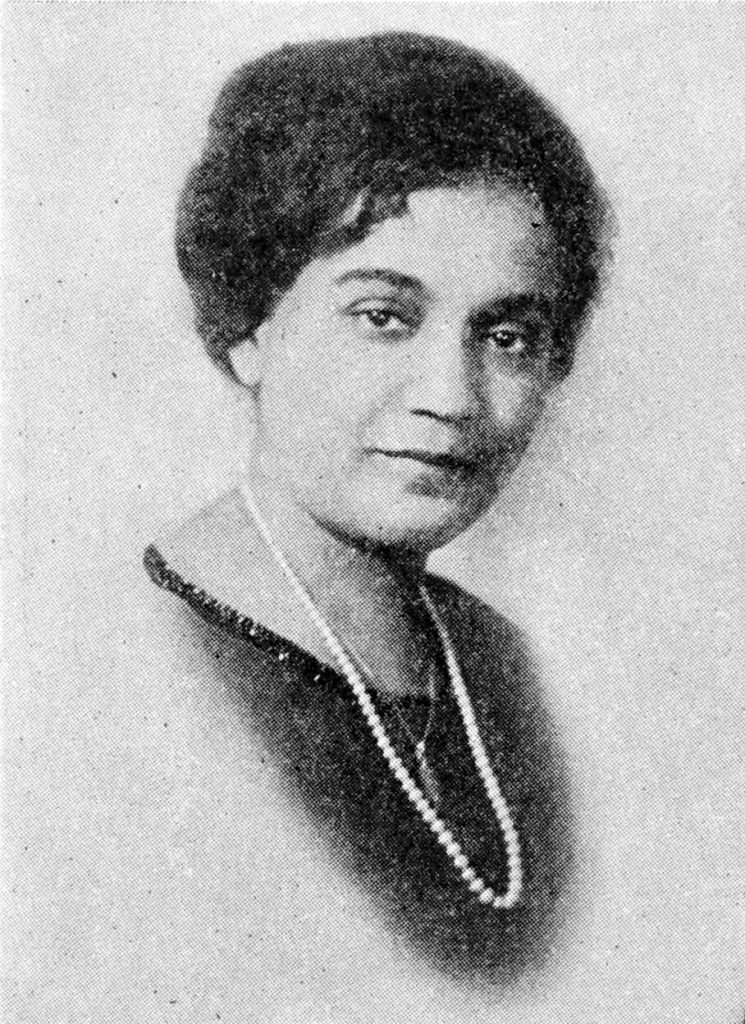79 Jessie Redmon Fauset (1882 – 1961)
Amy Berke; Robert Bleil; Jordan Cofer; and Doug Davis

Wikimedia Commons
Public Domain
Jessie Redmon Fauset, like her younger contemporary Countee Cullen, belongs to the first generation of Harlem Renaissance writers who used traditional literary forms to explore issues important to the African-American community. In this way, the growth of these writers can be likened to the path traced by nineteenth-century British women writers and outlined in Elaine Showalter’s book A Literature of Their Own (1977). In her study of women writers, Showalter traced three stages of literary development. In the first stage, underrepresented authors use traditional forms and adopt traditional viewpoints in order to gain wider acceptance. In the second stage, authors begin to use traditional forms to advance new viewpoints while, in the third stage, authors adopt new forms to advance progressive viewpoints. In many ways, these same three stages that Showalter assigned to British women writers of the nineteenth century can be applied to the writers of the Harlem Renaissance. Both Fauset and Cullen can be classified as second stage writers: those who used traditional forms to celebrate new ideas.
For much of the early twentieth century, Fauset was the literary editor of The Crisis, and her selections, as well as her own writing, adhered to W. E. B. Du Bois’s mission statement for the magazine:
The object of this publication is to set forth those facts and arguments which show the danger of race prejudice, particularly as manifested today toward colored people. . . . The policy of The Crisis will be simple and well defined: It will first and foremost be a newspaper, . . . Secondly it will be a review of opinion and literature, . . . Thirdly it will publish a few short articles, . . . Finally, its editorial page will stand for the right of men, irrespective of color or race, for the highest ideals of American democracy, and for reasonable but earnest and persistent attempt to gain these rights and realize these ideals. The Magazine will be the organ of no clique or party and will avoid personal rancor of all sorts. In the absence of proof to the contrary it will assume honesty of purpose on the part of all men, North and South, white and black.5
As the first African-American elected to the Phi Beta Kappa honor society at Cornell University (1905) and as a master’s graduate of the University of Pennsylvania, Fauset was well positioned to advance Du Bois’s goals. Like Cullen and other early members of the Harlem Renaissance, Fauset was an articulate voice for a certain segment of the African-American community.
While Fauset’s relatively privileged position granted her access to mainstream literary circles of her time, this same privilege ultimately alienated her from other members of the Harlem Renaissance. Many of Fauset’s works concern the struggles of light-skinned, middle-class African-Americans to assimilate and succeed over the limitations of their racial identities, and this largely positive portrayal of assimilation and passing angered other members of the movement like Langston Hughes who argued for a full embrace of African-American racial identity.
The selection from Fauset, “The Sleeper Wakes” (1920), challenges both our preconceptions about Fauset and the attacks on her by Hughes. Although the story directly concerns the life of a light-skinned African-American who is married to a white husband, Fauset’s heroine, Amy, is ultimately unsettled by her success at passing. Stirred to action by her husband’s mistreatment of an African-American servant, Amy recognizes her racial identity and awakens as the title suggests. Awakened to her racial identity, Amy leaves her husband and his money behind in order to live a more direct representation of her identity. Although Fauset and Cullen both embrace traditional literary forms, their presentation of race demonstrates their active engagement with issues of identity, politics, and the promises of the American experiment that are more progressive than their forms suggest.
Content Advisory
Literature involves language, descriptions, and/or topics that may be emotionally disturbing, graphic, or otherwise sensitive in nature. These topics (or materials) are important to the course as these words, attitudes, and biases are part of American literature and provide us with opportunities to better understand our history and society.

